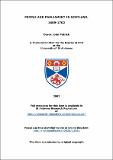Files in this item
People and parliament in Scotland, 1689-1702
Item metadata
| dc.contributor.advisor | Brown, Keith M. | |
| dc.contributor.author | Patrick, Derek J. | |
| dc.coverage.spatial | 456 p. | en_US |
| dc.date.accessioned | 2017-06-22T12:13:22Z | |
| dc.date.available | 2017-06-22T12:13:22Z | |
| dc.date.issued | 2002 | |
| dc.identifier | uk.bl.ethos.544377 | |
| dc.identifier.uri | https://hdl.handle.net/10023/11061 | |
| dc.description.abstract | In Scotland the Revolution of 1688 - 1689 has received little academic attention - considered little more than an adjunct of events in England. Traditionally, the political elite have been seen as reluctant to rebel, the resulting Convention Parliament containing few committed protagonists - the reaction of most determined by inherent conservatism and the overwhelming desire to preserve their own interest and status. Motivated essentially by self-interest and personal gain, the predominance of noble faction crippled Parliament - a constitutionally underdeveloped institution - which became nothing more than a platform for the rivalry and ambition of the landed elite. However, this interpretation is based on the dated notion that Scottish history can be considered as simply a protracted power struggle between a dominant territorial nobility and a weak monarch, intent on centralising authority. Nonetheless, the aim of the thesis is not to rewrite the political history of the Revolution or to chart the constitutional development of Parliament - although both aspects form part of the general analysis. Instead, this is principally a thematic study of the membership of the Convention Parliament and what they achieved, in terms of legislation and procedure. Taking into account the European context, including a thorough membership analysis, and revising the practical aspects of the Revolution settlement, it is possible to offer a fresh account of contemporary politics. Introducing the extensive contest that characterised the general election of 1689, and the emergence and progress of court and country politics through 1698 - 1702, study reveals the continuing development of an inclusive party political system similar to that evident in England. In this respect, the objective of the thesis is to address the main themes associated with the Revolution and Convention Parliament, providing an alternative, more accurate interpretation of the Scottish Revolution experience. | en_US |
| dc.language.iso | en | en_US |
| dc.publisher | University of St Andrews | |
| dc.subject.lcc | DA804.6P2 | |
| dc.subject.lcsh | Scotland--Parliament--History--17th century | en |
| dc.title | People and parliament in Scotland, 1689-1702 | en_US |
| dc.type | Thesis | en_US |
| dc.type.qualificationlevel | Doctoral | en_US |
| dc.type.qualificationname | PhD Doctor of Philosophy | en_US |
| dc.publisher.institution | The University of St Andrews | en_US |
This item appears in the following Collection(s)
Items in the St Andrews Research Repository are protected by copyright, with all rights reserved, unless otherwise indicated.

